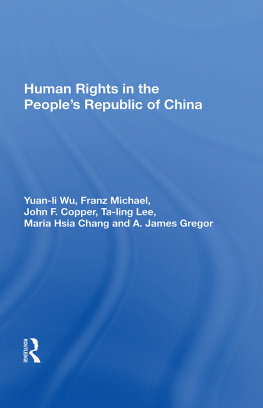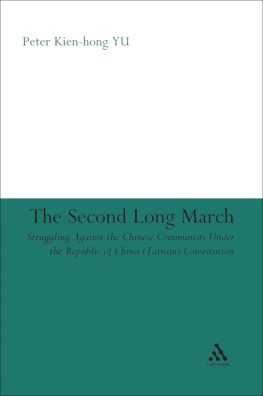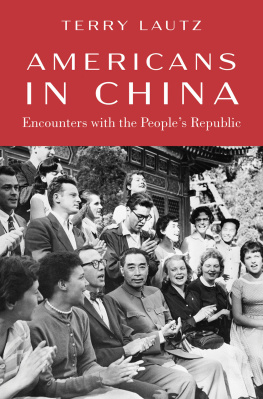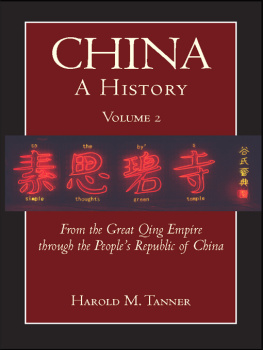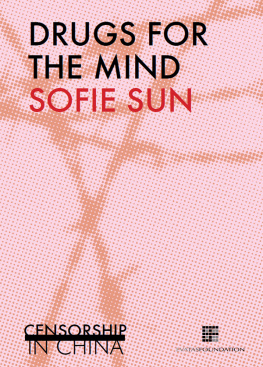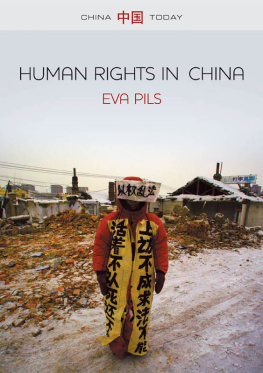Human Rights in the Peoples Republic of China
About the Book and Authors
This book examines the effects that political institutions, the legal system, and economic policies have had on the human rights record in the PRC since 1949. The authors first address the problems of assessing political liberties in a nation that emphasizes economic over civil rights and that has traditionally valued collective rights over individual freedom. In later chapters the authors describe how various target groupsintellectuals, youth groups, women, and religious and racial minoritieshave fared under communist leadership. Also included is a statistical analysis of the record of the PRC's judicial system, based on 38,000 cases of arrests, detentions, and sentences reported in the Chinese press.
The authors assert that human rights violations were more serious during the Cultural Revolution than at any other time in recent history, although the situation did not receive much attention in the world press or among human rights advocates. The documents show that in recent years the human rights record has improved somewhat, but the authors conclude that current trends are most discouraging.
Yuan-li Wu is professor of economics at the University of San Francisco and is a consultant at the Hoover Institution on War, Revolution and Peace, Stanford University. Franz Michael is professor emeritus at George Wash-ington University. John F. Copper is the Stanley J. Buckman Distinguished Professor of International Studies at Rhodes College. Ta-ling Lee is professor of history at Southern Connecticut State University. Maria Usia Chang is assistant professor of politics and government at the University of Puget Sound. A. James Gregor is professor of political science at the University of California, Berkeley.
First published 1988 by Westview Press
Published 2018 by Routledge
52 Vanderbilt Avenue, New York, NY 10017
2 Park Square, Milton Park, Abingdon, Oxon OX14 4RN
Routledge is an imprint of the Taylor & Francis Group, an informa business
Copyright 1988 by Taylor & Francis
All rights reserved. No part of this book may be reprinted or reproduced or utilised in any form or by any electronic, mechanical, or other means, now known or hereafter invented, including photocopying and recording, or in any information storage or retrieval system, without permission in writing from the publishers.
Notice:
Product or corporate names may be trademarks or registered trademarks, and are used only for identification and explanation without intent to infringe.
Library of Congress Cataloging-in-Publication Data
Human rights in the Peoples Republic of China / Yuan-li Wu [et
al.].
p. cm.(Westview special studies on China and East Asia)
Includes index.
ISBN 0-8133-7439-1
1. Human rightsChina. I. Wu, Yuan-li. II. Series.
JC599.C6H86 1988
323.490951dc19
87-22947
CIP
ISBN 13: 978-0-367-01413-1 (hbk)
Contents
, Franz Michael and Yuan-li Wu
PART ONE
HUMAN RIGHTS AND THE ESTABLISHMENT OF NATIONWIDE CONTROL
, John F. Copper
, Yuan-li Wu
PART TWO
THE PRC SYSTEM FROM 1949 TO 1984
, Franz Michael
, John F. Copper
, Yuan-li Wu
, Franz Michael
PART THREE
THE VICTIM GROUPS
, A. James Gregor
, Yuan-li Wu
, Ta-ling Lee
, Ta-ling Lee
, Ta-ling Lee
, Maria Hsia Chang
, Maria Hsia Chang
, Franz Michael
PART FOUR
CONCLUSION
, Yuan-li Wu and Franz Michael
, Yuan-li Wu
This study is a joint undertaking by six authors who have devoted a combined total of many years of research and writing on contemporary China, including nearly four decades of the Maoist and post-Mao communist period. Since the authors individual specialties cover several disciplines, the study presents not only a history of human rights in China under communism; it is also a general, multidisciplinary analysis of China.
Publication of the book at this time is meant to offer both the serious student and the casual reader of Chinese affairs a ready source of reference on the human condition in China. While the watchword in China in the 1980s is economic development, we wish to remind both the Chinese and the outside world that the real and ultimate goal of all development is to improve the human condition. Lest we forget.
Contributions in research and data processing from the following have been invaluable in the preparation of this volume: C. N. Wang, Lynn Chen, and Y. H. Wu. As coordinator of this joint undertaking, I take this opportunity to express also my appreciation of the cooperative spirit in which all the authors have worked with one another and have successfully fitted this joint effort into their respective crowded schedules. The research, secretarial, and library staff of the Hoover Institution, whose assistance has been monumental, especially to me, deserve a special, heartfelt thanks.
Finally, thanks are due to the China Times Cultural Foundation of New York for its help in disseminating information on the publication of this volume.
Yuan-li Wu
Franz Michael and Yuan-li Wu
This work is a study of human rights in China from the inception of the Peoples Republic of China (PRC) in 1949 until 1984. As such, this book is also a general history of the Chinese people in every aspect of their lives. Relationships between the state and the people, social bonds within families and communities, economic activities, culture, and thought processes all came under the powerful, continual assault and manipulation of the Chinese Communist party (CCP) and its leaders in these thirty-six years; thus, a history of human rights in China during this period becomes indistinguishable from a history of China.
Such a study is both necessary and timely. It is necessary because the fate that befell a generation in China was unprecedented in scope, magnitude, and ferocity. The record must be kept straight both for those whose memory has dimmed with time and for the many others who may never have known what actually transpired in that part of the globe. In the West, the reality too often is ignored or romanticized. Like the Holocaust in Europe, this aspect of the Chinese Communist experience must be remembered as a part of the modern threat to our common humanity.
This is a timely study because Chinese communism has been undergoing unusual changes during the past half decade. It is vital that the past and the true nature of current problems be seen more clearly so that we may be better prepared to face the evolving Chinese scene in the future.
The size of China adds to the dimension of the Chinese experience; so does the fact that Chinese culture has been one of the most influential in human development. That Chinese communism has tried desperately to undermine this culture amplifies the importance of the Chinese story. The universal human condition in our era cannot be divorced from the experiences of Chinas more than 1 billion people, a quarter of the human race. Therefore, the issue of human rights in China is crucial both for the future of China and for the part China will play in the future of human rights.

